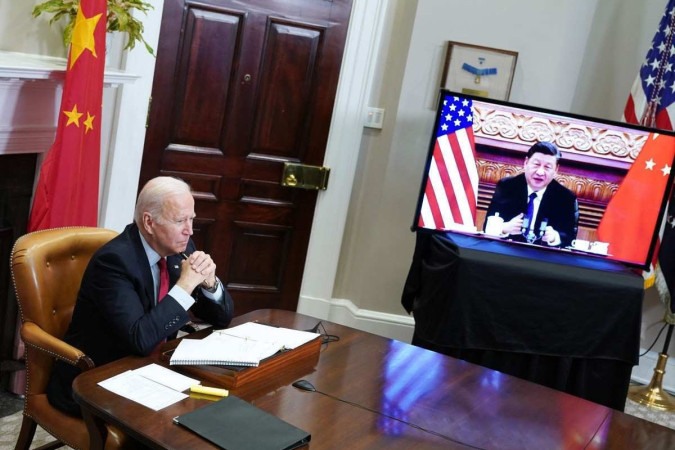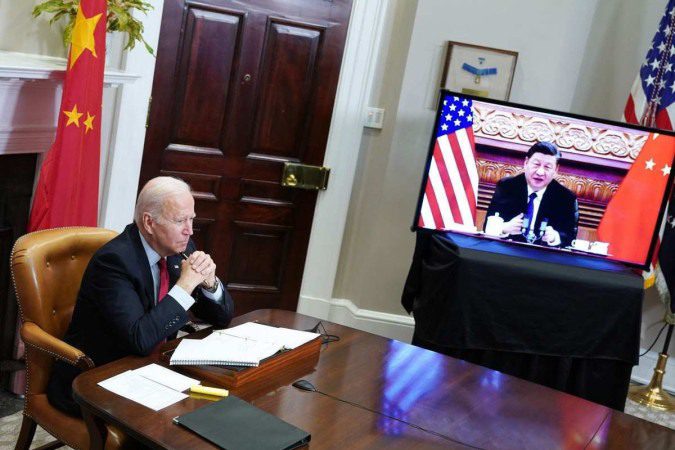Strained relations will be put on the table in a meeting between Biden and Xi Jinping
5 min read
Published 11/13/2022 06:00

(Credit: Mandel Ngan/AFP)
For the first time, the leaders of the two greatest powers on the planet will come face-to-face, in person, at a meeting on the sidelines of the G-20 summit (a grouping of 19 major economies plus the European Union), in Bali (Indonesia). According to the White House, Presidents Joe Biden and Xi Jinping will discuss “efforts to maintain and deepen lines of communication between the United States and China.” Tomorrow’s meeting will also discuss ways to responsibly manage competition and work together in areas of alignment of interests “particularly with regard to cross-border challenges affecting the international community,” the US government statement said.
However, other important topics will be brought up by the two heads of state. The high-level meeting comes days after China’s ally North Korea carried out a series of missile launches – one of the simulations involving an intercontinental ballistic missile, which appears to have failed, according to South Korea. US gestures to Taiwan caused uneasiness in Beijing. China has toughened its rhetoric on the democratic island, which it considers an inalienable part of its territory. Pressure for a greater role from China to get Russia to stop the war in Ukraine is also likely to emerge in Bali. Xi and Biden held a bilateral meeting via video conference on November 15, 2021.
On Wednesday, Biden said that “what he wants to do when they talk is to define what kind of a mutual red line shouldn’t be crossed.” “The doctrine on Taiwan has not changed at all,” he stressed. The Americans have avoided previous comments that the US military would defend Taiwan if the island was attacked by China.
sovereignty
Zhao Lijian, a spokesman for the Chinese Foreign Ministry, was keen to stress that China’s policy toward the United States is “consistent and clear.” “We are committed to mutual respect, peaceful coexistence and win-win cooperation with the United States. At the same time, we vigorously defend our sovereignty, security and developing interests,” he said. He said it is important for Washington to work with Beijing “to appropriately address differences, promote beneficial cooperation, avoid misunderstanding and miscalculation, and put Sino-US relations back on the right track of strong and sustainable development.”
Minister Counselor at the Chinese Embassy in Brazil Li Qi told Corio newspaper that Sino-US relations are “perhaps the most complex and most important in the contemporary world.” “Having these relations was not and will not be easy. I would like to quote the last sentence of former Secretary of State Henry Kissinger in his book on China: ‘The United States and China can join forces not to destabilize the world, but to build it.’ It is a very important reflection, but The keys are in the hands of the USA,” he commented. “They have to change their view of China, which is a different country and a different civilization, as well as restore proper respect and abandon outdated Cold War mentalities.”
Bonnie Glaser, director of the Asia program at the US German Marshall Fund think tank (in Washington), noted that relations between the two countries have steadily worsened over the past few years. “Can they put an end to the relationship and stop this deterioration?” asked the China expert, who does not hide her pessimism. She explained that for a year and a half, the Biden administration had been trying to persuade Xi Jinping to stop this relationship from spiraling out of control. He warned that “no progress has been made. The Chinese are not very interested in risk reduction measures or in talks about strategic stability. Since Nancy Pelosi’s visit to Taiwan, bilateral contacts have been limited.”
According to Glaser, the US imposition of export restrictions on semiconductors has further convinced China that Americans are seeking to stem China’s rise. “Mutual distrust is on the rise.” The move is expected to complicate the development of advanced semiconductors on Chinese soil.
Xi arrived at the meeting in Bali with a stronger stance, after winning a third term at the Chinese Communist Party Congress and establishing himself as the most influential and powerful leader since Mao Zedong. Biden, in turn, came out of the midterm elections with more profits than losses – the Republican “red wave” did not occur and gave the government a boost. According to Agence France-Presse (AFP), Biden has turned his rivalry with China into the main thrust of his foreign policy, despite his unwillingness to a new “Cold War”.
Topics on the agenda
Find out what Biden and Xi are expected to talk about next Tuesday
Taiwan
House Speaker Nancy Pelosi’s visit to Taiwan last August strained relations between Washington and Beijing. The United States also announced a $1.1 billion (about BRL 5.8 billion) arms package for the Democratic Republic of the Congo. China considers Taiwan an inalienable part of its territory and threatens to crush any separatist desire.
North Korea
The United States intends to persuade China to pressure Beijing’s ally North Korea to halt missile launches recorded in recent weeks. Washington also expects the Kim Jong Un regime to engage in negotiations for the complete denuclearization of the Korean peninsula.
Ukraine
Joe Biden believes that Xi Jinping needs to exercise his influence to deter Russian President Vladimir Putin from continuing the war in Ukraine. Xi’s recent remarks, in which the Chinese leader warned Moscow against using nuclear weapons in Ukraine, indicate that Beijing is beginning to alienate Russia over the conflict.
Business
The United States has long denounced China’s predatory trade practices, which would have jeopardized the competitiveness of American products in the international market. This topic is usually dealt with in relations between the authorities of the two countries.
I suspect…
(Photo: Photos: Personal Archive)
“Expectations about the meeting between Joe Biden and Xi Jinping are very low. It is unlikely that there will be tangible results. There is a possibility that they will agree to cooperate on some issues, such as food security, and then direct their own teams to discuss the details. This outcome would be welcomed by most of the world’s nations “.
Bonnie Glaser, Director of the Asia Program at the German Marshall Fund Research Center in the US (based in Washington)
phrase
“They have to change their view of China, which is a different country and a different civilization, as well as restore proper respect and put aside the outdated mentalities of the Cold War.”
Li Qi, Minister Counselor of the Chinese Embassy in Brazil

“Devoted food specialist. General alcohol fanatic. Amateur explorer. Infuriatingly humble social media scholar. Analyst.”





